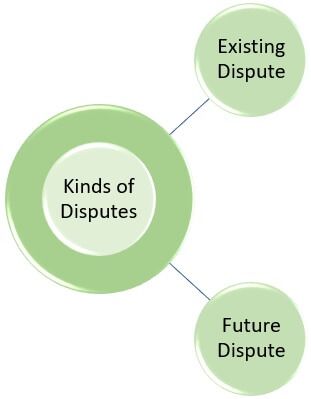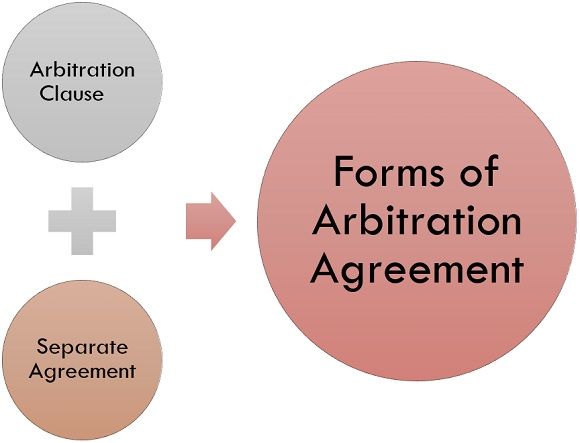Definition: Arbitration is a procedure of making a decision by an outsider for a dispute settlement between two parties. In this process, the arbitrator makes an impartial decision that will become mandatory for both parties to follow. Here, the arbitrator is an individual appointed to resolve the disputes and differences of two parties. The arbitrator makes his decision on the basis of sound proves and should not be biased with any party.
Content: Arbitration
- Arbitration Agreement
- Power to refer parties to an arbitration
- Interim Measures by the Court
- Conclusion
Arbitration Agreement
Arbitration Agreement comes under section 7 (1) of the Arbitration and Conciliation Act. It is an agreement made amongst two parties for the dispute already arisen or can arise in the future course of time, therein for a specified legal relationship either contractual or not. Thus, the arbitration agreement deals with two kinds of disputes:

- Existing Dispute: The disputes which have already occurred.
- Future Dispute: The disputes which may arise in future.
Subsection (2) of section 7 defines the forms of the arbitration agreement. The following are the two forms:

- Arbitration Clause
Arbitration Clause signifies if the agreement between two parties consists of any clause defining any dispute aroused amongst parties that can be taken to the arbitrator for making the settlement.
- Separate Agreement
A Separate Agreement is an agreement made by two parties with mutual consent other than the clause mentioned in the agreement so that in case of dispute it will be sent to the arbitrator as proof.
Subsection (3) of section 7 defines that arbitration agreement must be in written form as an oral arbitration agreement is not valid and Subsection (4) of section 7 clarifies the circumstances under which an arbitration agreement is deemed to be in writing. The following are some circumstance when the agreement is deemed to be written are:
- If there is any discussion about arbitration agreement in any document and the parties signed the papers, then this will be considered as a written arbitration agreement.
- If the conversation between two parties is by way of telegram, letter or by any other means of telecommunication and there is any discussion about arbitration declaration. And if we get a record of that arbitration agreement through that conversation then we can say here the conversation about the existence of arbitration agreement can be treated as a written arbitration agreement.
- The last ground on which we can say it as a written arbitration agreement is that if amongst two parties one claims any dispute and the other one takes a defense of such claim. Thus, here the exchange of claim and defence if any of the party makes question on the existence of arbitration agreement and other party don’t deny for it. So here it will be considered that an arbitration agreement is in writing.
Power to refer parties to an arbitration
Section 8 of the arbitration agreement defines that if there is any matter of dispute amongst two parties and on this matter of the dispute case is already running before the court or judicial authority such matter of the dispute is considered as the subject of arbitration or a subject of an arbitration agreement. In this situation, either party or its representative can apply in court that the matter should be referred to arbitration, and if the court agrees to forward the matter to arbitration, it can do so. But either party applying for it should apply for it before his first statement in his favour. The court will look after it that matter for which party or representative has applied to refer to arbitration can validly dispose of by the arbitration if it is so then the court will refer it to the arbitration or the arbitral tribunal.
Interim Measures by the Court
According to section 9 of the Arbitration and Conciliation Act, the party wants the court to issue interim measures for which the party applies to court. The factors that come under this section are as follows:
- When can a party apply for interim measures?
Party can apply for an interim dividend to the court before arbitral proceeding, after the arbitral proceeding, and even after passing the arbitral award but only before the execution of the arbitral award.
- What can be asked by the party in interim measures by the court?
The party can ask the following points in interim measures issued by the court:
- It can ask to appoint a guardian of a minor or unsound mind person.
- It can ask for the preservation and protection of property.
- It can ask for the appointment of receivers.
An essential point of section 9 is that; if the party has applied for the interim measures and the court has issued an interim measure, then from the date of issue of interim measure within 90 days the formation of an arbitral tribunal is mandatory. After the formation of the arbitral tribunal court cannot issue any interim measure until the court feels that the interim measures issued by the arbitral tribunal are not sufficient. Arbitral tribunal issues interim measures on the application of the party according to the provision of section 17 of Arbitration and Conciliation Act.
Conclusion
Arbitration is a process in which a third party called arbitrator listens to the matter of dispute from both the concerning parties and make an unbiased decision to solve such dispute on the basis of proves presented to him by the parties. It has attained a certain degree of success in settling disputes amidst management and labours.
Leave a Reply